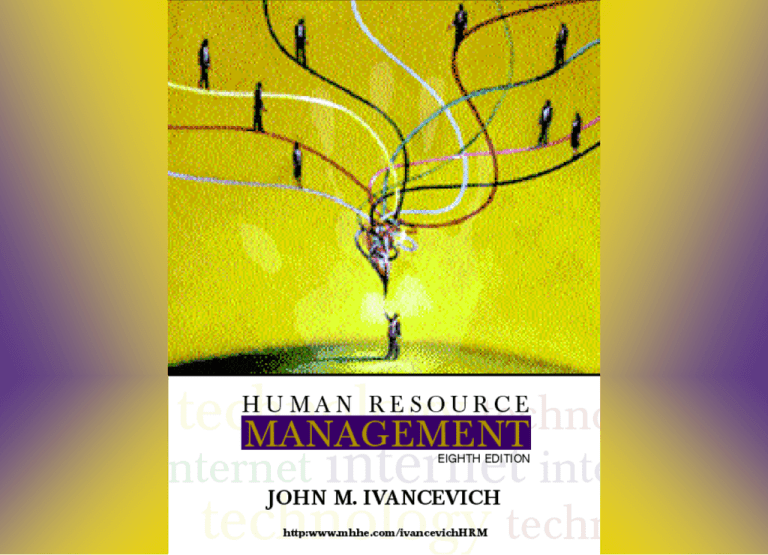
Irwin/McGraw-Hill
Copyright © 2001 by The McGraw-Hill Companies, Inc. All rights reserved.
15
Chapter Fifteen
Managing Employee Discipline
LEARNING OBJECTIVES
LIST
four behavioral categories of difficult
employees
DESCRIBE steps that can be taken to prevent theft
by employees
DISCUSS the elements of a disciplinary system
DEFINE employment at will
EXPLAIN why some employees are opposed to drug
testing, even after an accident
Irwin/McGraw-Hill
Copyright © 2001 by The McGraw-Hill Companies, Inc. All rights reserved.
15-2
Managing Employee Discipline:
The Discipline Process
Diagnose
internal and
external factors in
discipline situations
Prescribe
Employee
Rights
and implement
appropriate remedial
actions
Management
Prerogative
Evaluate
the effectiveness
of the discipline decisions
Irwin/McGraw-Hill
Copyright © 2001 by The McGraw-Hill Companies, Inc. All rights reserved.
15-3
Managing Employee Discipline:
Behavioral Categories
Ineffective Employees:
Those whose quality or quantity of work is
unsatisfactory
Alcoholic and Substance-Abusing Employees:
Those whose personal problems off the job
begin to affect productivity on the job
Participants in Theft and Other Illegal Acts:
Those who violate laws while on the job
Rule Violators:
Those who consistently break company rules
and do not respond to supervisory reactions
Irwin/McGraw-Hill
Copyright © 2001 by The McGraw-Hill Companies, Inc. All rights reserved.
15-4
Drug Testing & Employee Discipline:
Employee/Employer Viewpoints
Employee’s
perceived right
to privacy or
confidentiality
DRUG
TESTING
Defamation of character
claims
Negligence claims
Invasion of privacy claims
Irwin/McGraw-Hill
Employer’s
legitimate
business &
liability interests
Insurance costs
Lawsuits
Productivity concerns
Safety & health concerns
Copyright © 2001 by The McGraw-Hill Companies, Inc. All rights reserved.
15-5
Drug Testing & Employee Discipline:
Common Legal Approaches
DRUG TESTING FOR CAUSE
Conducted
for reasonable cause (e.g., after accidents)
Courts generally uphold such drug testing for public & private
employees
DRUG TESTING TO ENSURE PUBLIC SAFETY
Used
by governments & transportation-related businesses
Conducted in various forms by governments & transportationrelated businesses
POST-REHABILITATION OR EAP DRUG TESTING
Conducted
following professional diagnosis & treatment programs
Recovering addicts, not current users, receive ADA protection
Irwin/McGraw-Hill
Copyright © 2001 by The McGraw-Hill Companies, Inc. All rights reserved.
15-6
Drug Testing & Employee Discipline:
Suspect Approaches
RANDOM DRUG TESTING
Conducted
at the will or discretion of an employer
Employees
often chosen through a random number generator
program
Raises
considerable illegal search and seizure and privacy rights
under the Fourth Amendment
Must
considerable applicable federal and state laws that may
regulate employee drug testing
Often
the courts and some states forbid an employer from
randomly drug testing its employees
Irwin/McGraw-Hill
Copyright © 2001 by The McGraw-Hill Companies, Inc. All rights reserved.
15-7
Employee Theft and Illegal Acts
RECENT APPROACHES EMPHASIZE:
Problem
recognition
Prevention
Conflict confrontation
INCLUDES THE USE OF:
Security
programs
Pre-employment screening
Other ways (see exhibit 15-2)
Irwin/McGraw-Hill
Copyright © 2001 by The McGraw-Hill Companies, Inc. All rights reserved.
15-8
Approaches to Discipline
HOT STOVE RULE
Warning
system
Immediate burn
Consistency
Impersonality
PROGRESSIVE DISCIPLINE
Sequence
of penalties for actions
Penalties move from less severe to
more severe
Due process at work
See example in Exhibit 15-6
POSITIVE DISCIPLINE
Considered
more future-oriented
Deemphasize punitive action
Work with employees to solve
disciplinary problems
Irwin/McGraw-Hill
Copyright © 2001 by The McGraw-Hill Companies, Inc. All rights reserved.
15-9
Employment At Will
Employment at will describes an employment
relationship of an indefinite duration
that may be terminated by an employee
or employer at any time without
notice for good cause, for no cause,
or even for cause morally wrong.
NON-STATUTORY EXCEPTIONS:
Existence
of an implied contract
Covenant of good faith and fair dealing
Violation of public policy
Irwin/McGraw-Hill
Copyright © 2001 by The McGraw-Hill Companies, Inc. All rights reserved.
15-10
Employment at Will and
Probationary Employees
MOST COMMON TYPES
OF PROBATION:
Initial Hire or Rehire Probation
Promotion or Transfer Probation
Disciplinary Probation
Irwin/McGraw-Hill
Copyright © 2001 by The McGraw-Hill Companies, Inc. All rights reserved.
15-11
Employment at Will &
Probationary Employees:
Some Employment-Related Issues
Duration and Extensions of Probationary Periods
Legal,
but should be supported by job-related factors
Benefits and Compensation
New
hires may be paid on two-tier scale & receive only
mandated benefits
Assessment and Training
Broad
authority to assess job related behaviors during probation
Employment Law
Probationary
Irwin/McGraw-Hill
employees retain employment law protection
Copyright © 2001 by The McGraw-Hill Companies, Inc. All rights reserved.





